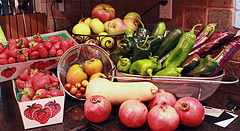
 According to Dr. Daniel Nixon, “Reshaping your diet is one of the most important ways you can join your healthcare team as an active participant in fighting relapse of your disease, improving your chances of remission, and nurturing your well-being.”
According to Dr. Daniel Nixon, “Reshaping your diet is one of the most important ways you can join your healthcare team as an active participant in fighting relapse of your disease, improving your chances of remission, and nurturing your well-being.”
Food can have a profound effect on your chances of relapse. A study in 2007 performed by the Dana-Farber Cancer Institute showed that a diet heavy with red meat, fatty foods, and desserts-the same diet that increases risk of colon cancer in the first place-put survivors at greater risk of having their colon cancer return.
Another study published in the Journal of Clinical Oncology showed that women consuming 10 servings of fruits and vegetables a day (double the recommended servings) had a lower risk of breast-cancer relapse after 7 years than those who stayed with current guidelines.
So what should you eat? Here are a few recommendations, taken from the American Institute for Cancer Research. You may also want to consider the book What to Eat if You Have Cancer by Maureen Keane and Daniella Chace, which outlines the best foods to fight cancer and keep your body strong, as well as providing personalized meal plans to complement different types of treatments. Dr. Nixon also has a book called The Cancer Recovery Eating Plan: The Right Foods to Help Fuel Your Recovery.
Foods to Enjoy
• Foods that contain beta carotene, which may prevent recurring tumors-try cantaloupe, carrots, sweet potatoes, and squash.
• Beans: The phytochemicals in these little legumes may protect cells from damage. They’re also rich in fiber. Try peas, as well as black, soy, dark red and white kidney, navy, pinto, and yellow beans.
• Berries: These colorful fruits have vitamin C, fiber, and lots of antioxidants. One particular one called “ellagic acid” has shown the ability to prevent certain cancers and to slow reproduction of cancer cells. Choose strawberries, blueberries, cherries, and blackberries.
• Dark green, leafy vegetables: Full of folate and carotenoids, these goodies also have great dietary fiber. Try spinach, kale, romaine lettuce, mustard greens, collard greens, chicory and Swiss chard.
• Garlic: In lab studies, compounds in garlic have been found to stop the growth of tumors.
• Flaxseed: Rich in omega-3 fatty acids, phytochemicals in this food may mimic estrogen in the body, reducing the chances for estrogen-related cancers. It’s available as flaxseed flour, meal, and oil-add to your morning smoothies or other recipes.
• Grapes and grape juice: These have “resveratrol,” a natural plant chemical that may possess potent antioxidant activity.
• Green tea: It contains about 3 times as many “catechins” as black tea-the natural chemical that seems to prevent cancer development.
• Tomatoes: They contain lycopene, which has been shown to protect against prostate cancer. Tomato components also stopped breast, lung, and endometrial cancer cells in lab studies.
• Whole grains: They’re rich in fiber, antioxidants and many more goodies that protect cells from damage and keep toxins flushed out of the body. Try brown rice, wheat breads, whole-grain oat cereals, popcorn, and kasha (roasted buckwheat). Check labels for the name of the grain-avoid “enriched” flours.
Have you found your diet to be helpful in your recovery? Please share your story.
Photo courtesy of Jen Hansen via Flickr.com.

